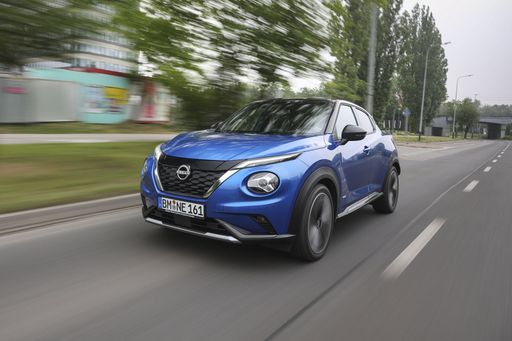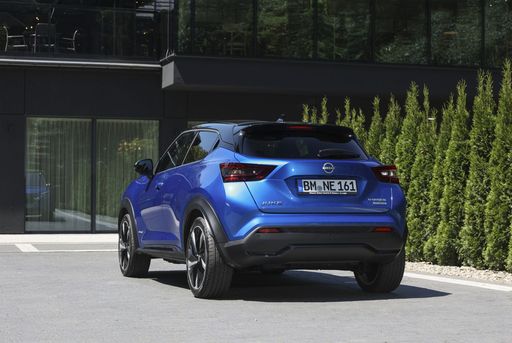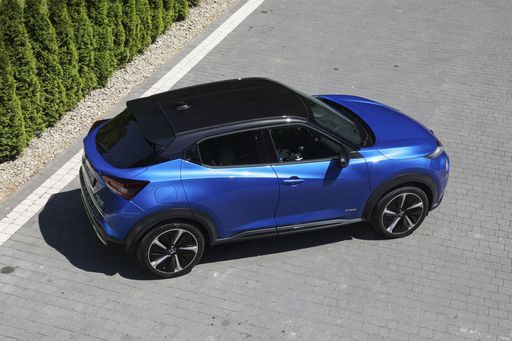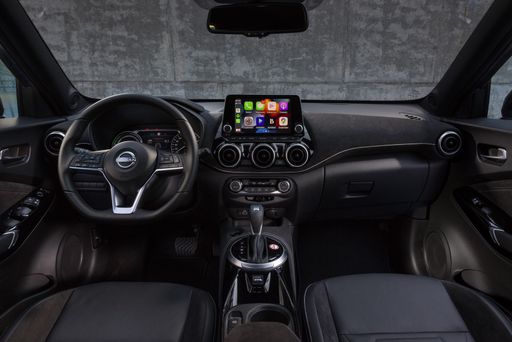Nissan Juke VS Nissan Leaf – Specs, Efficiency & Price Comparison
Which model is the better choice – the Nissan Juke or the Nissan Leaf? We compare performance (143 HP vs 217 HP), boot capacity (422 L vs 394 L), efficiency (4.70 L vs 16.70 kWh), and of course, the price (21400 £ vs 30800 £).
Find out now which car fits your needs better!
The Nissan Juke (SUV) is powered by a Petrol or Full Hybrid engine and comes with a Manuel or Automatic transmission. In comparison, the Nissan Leaf (Hatchback) features a Electric engine and a Automatic gearbox.
When it comes to boot capacity, the Nissan Juke offers 422 L, while the Nissan Leaf provides 394 L – depending on what matters most to you. If you’re looking for more power, you’ll need to decide whether the 143 HP of the Nissan Juke or the 217 HP of the Nissan Leaf suits your needs better.
There are also differences in efficiency: 4.70 L vs 16.70 kWh. In terms of price, the Nissan Juke starts at 21400 £, while the Nissan Leaf is available from 30800 £.
Compare all the key specs now and find out which model fits your lifestyle best!
Nissan Juke
The Nissan Juke stands out with its distinctive design and bold styling, making it a popular choice for those seeking something different on the road. Its interior cleverly combines modern technology with comfort, offering an enjoyable driving experience for both the driver and passengers. Despite its compact size, the Juke provides a surprising amount of space and versatility, making it suitable for urban adventures and weekend getaways alike.
details @ germany.nissannews.com
@ germany.nissannews.com
 @ germany.nissannews.com
@ germany.nissannews.com
 @ germany.nissannews.com
@ germany.nissannews.com
 @ germany.nissannews.com
@ germany.nissannews.com
Nissan Leaf
The Nissan Leaf stands out as a pioneering model in the realm of electric vehicles, known for its impressive blend of practicality and eco-friendliness. It offers a smooth and quiet driving experience, making it an ideal choice for city commuting and longer journeys alike. The interior design is both comfortable and intuitive, providing drivers with a sense of modernity and ease of use.
details @ germany.nissannews.com
@ germany.nissannews.com
 @ germany.nissannews.com
@ germany.nissannews.com
 @ germany.nissannews.com
@ germany.nissannews.com
 @ germany.nissannews.com
@ germany.nissannews.com

|

|
|
|
|
Costs and Consumption |
|
|---|---|
|
Price
21400 - 30100 £
|
Price
30800 - 37200 £
|
|
Consumption L/100km
4.7 - 6 L
|
Consumption L/100km
-
|
|
Consumption kWh/100km
-
|
Consumption kWh/100km
16.7 - 17.8 kWh
|
|
Electric Range
-
|
Electric Range
270 - 385 km
|
|
Battery Capacity
0.60 kWh
|
Battery Capacity
39 - 59 kWh
|
|
co2
107 - 136 g/km
|
co2
0 g/km
|
|
Fuel tank capacity
46 L
|
Fuel tank capacity
-
|
Dimensions and Body |
|
|---|---|
|
Body Type
SUV
|
Body Type
Hatchback
|
|
Seats
5
|
Seats
5
|
|
Doors
5
|
Doors
5
|
|
Curb weight
1274 - 1405 kg
|
Curb weight
1580 - 1756 kg
|
|
Trunk capacity
354 - 422 L
|
Trunk capacity
385 - 394 L
|
|
Length
4210 mm
|
Length
4490 mm
|
|
Width
1800 mm
|
Width
1788 mm
|
|
Height
1593 mm
|
Height
1540 - 1545 mm
|
|
Payload
405 - 427 kg
|
Payload
384 - 415 kg
|
Engine and Performance |
|
|---|---|
|
Engine Type
Petrol, Full Hybrid
|
Engine Type
Electric
|
|
Transmission
Manuel, Automatic
|
Transmission
Automatic
|
|
Transmission Detail
Schaltgetriebe, Automat. Schaltgetriebe (Doppelkupplung), Automatikgetriebe
|
Transmission Detail
Reduction Gearbox
|
|
Drive Type
Front-Wheel Drive
|
Drive Type
Front-Wheel Drive
|
|
Power HP
114 - 143 HP
|
Power HP
150 - 217 HP
|
|
Acceleration 0-100km/h
10.1 - 11.8 s
|
Acceleration 0-100km/h
6.9 - 7.9 s
|
|
Max Speed
166 - 180 km/h
|
Max Speed
144 - 157 km/h
|
|
Torque
200 Nm
|
Torque
320 - 340 Nm
|
|
Number of Cylinders
3 - 4
|
Number of Cylinders
-
|
|
Power kW
84 - 105 kW
|
Power kW
110 - 160 kW
|
|
Engine capacity
999 - 1598 cm3
|
Engine capacity
-
|
General |
|
|---|---|
|
Model Year
2024
|
Model Year
2019
|
|
CO2 Efficiency Class
D, E, C
|
CO2 Efficiency Class
A
|
|
Brand
Nissan
|
Brand
Nissan
|
Nissan Juke
Introduction to the Nissan Juke: A Compact SUV with Style
The Nissan Juke has always been a standout in the compact SUV segment, renowned for its bold design and impressive versatility. As we look at the 2024 model year, Nissan continues to innovate, offering a range of options that cater to both practicality and driving pleasure.
Performance and Efficiency: Under the Bonnet of the Nissan Juke
The 2024 Nissan Juke comes with a variety of engine choices tailored to suit different driving needs. With power outputs ranging from 114 to 143 PS, these engines strike a balance between performance and efficiency. The petrol options are equipped with a 1.0-litre three-cylinder engine that generates 114 PS, providing a sprightly drive perfect for urban environments. Meanwhile, the 1.6-litre hybrid version offers 143 PS, combining electric and petrol power for a more eco-friendly performance.
Fuel consumption varies between 4.7 and 6 L/100km, highlighting the Juke's commitment to efficiency. With CO2 emissions ranging from 107 to 137 g/km, the Nissan Juke offers an environmentally conscious choice for drivers seeking to reduce their carbon footprint.
Driving Technology and Innovation
Innovation is at the heart of the Nissan Juke, with cutting-edge technology designed to enhance the driving experience. The hybrid variants use a unique full-hybrid system, incorporating a small 0.6 kWh battery to provide seamless power assistance during acceleration. This system not only improves efficiency but also supports a smooth, responsive driving experience.
The Juke's manual gearboxes and various automatic transmission options, including the efficient dual-clutch transmission, ensure that drivers can choose the driving style that best suits their preferences. Front-wheel drive remains standard across the range, delivering dependable and predictable handling characteristics.
Design and Comfort: More Than Just Looks
The Juke's exterior is daringly distinctive, with a design that combines angular lines and a high-riding stance to create a sporty yet practical profile. The dimensions of 4,210 mm in length, 1,800 mm in width, and 1,593 mm in height, combined with its 5-door configuration, ensure ample space and accessibility for passengers and luggage alike.
Inside, the Nissan Juke accommodates up to five passengers with comfort and style. A boot capacity ranging from 354 to 422 litres provides adequate space for everyday life or weekend getaways. The various trim levels, including Acenta and Tekna, are equipped with premium features and technology to keep occupants entertained and comfortable.
Safety Features and Driver Assistance
Nissan has equipped the Juke with an array of safety features that provide peace of mind on the road. The Juke includes standard and optional technologies such as adaptive cruise control, lane-keeping assist, and emergency braking systems, enhancing both driver confidence and passenger safety.
With CO2 efficiency classes ranging from C to E, the Nissan Juke not only delivers advanced safety but also meets modern environmental standards.
Conclusion: A Balanced Compact SUV
The 2024 Nissan Juke stands out as a compelling choice in the compact SUV market. With its combination of eye-catching design, innovative technology, and efficient performance, the Juke continues to attract drivers looking for a unique vehicle that doesn’t compromise on practicality or driving pleasure. Whether in the city or on the open road, the Juke delivers a driving experience that is both thrilling and responsible.
Nissan Leaf
Introduction to the Nissan Leaf: A Pioneer in Electric Mobility
The Nissan Leaf has established itself as a trailblazer in the realm of electric vehicles (EVs) since its launch. As we delve into its present-day iterations, the Leaf continues to soar in popularity due to remarkable advancements in technology and sustainability. Let's explore what makes the Nissan Leaf a standout in today's automotive market.
Power and Performance: Under the Hood of the Nissan Leaf
The Nissan Leaf boasts a power output ranging from 150 to 217 PS, depending on the battery option chosen. The vehicle's electric motor, a product of cutting-edge engineering, offers instant torque ranging from 320 to 340 Nm, resulting in impressive acceleration capabilities. The 0 to 100 km/h dash is achieved in as little as 6.9 seconds, showcasing its prowess in electric performance.
Battery Technology: Efficient Energy Management
When discussing the Nissan Leaf, battery technology is at the forefront. The available battery capacities range from 39 to 59 kWh, supporting an electric range between 270 to 385 km. This flexibility allows drivers to choose a model that best fits their driving habits, providing peace of mind for longer journeys without frequent recharging.
Sustainability: The Environmental Edge
One of the primary attractions of the Nissan Leaf is its commitment to sustainability. As an all-electric vehicle, it produces zero CO2 emissions, placing it in the top tier of the CO2-efficiency class with an 'A' rating. This clean energy approach contributes significantly to reducing environmental impact and supports Nissan's drive towards a greener future.
Design and Comfort: Aesthetic Appeal and Practicality
The Nissan Leaf is not just about efficiency; it's also designed for comfort and utility. With its sleek hatchback body and dimensions of 4490 mm in length, 1788 mm in width, and a height of up to 1545 mm, it offers ample interior space. The boot capacity ranges from 385 to 394 litres, providing sufficient storage for everyday needs. The model accommodates five passengers comfortably, ensuring a pleasant ride for everyone.
Innovations and Safety: Advanced Features for Peace of Mind
Nissan equips the Leaf with an array of intelligent features that enhance safety and convenience. The available equipment lines, including N-CONNECTA, Tekna, e+ N-CONNECTA, and e+ Tekna, offer varying levels of technology integration. ProPILOT Assist, e-Pedal, and a comprehensive suite of driver-assistance technology are just a few examples that highlight Nissan's commitment to innovation in the EV market.
Conclusion: The Nissan Leaf Continues to Lead
With prices ranging from €35,900 to €43,400, the Nissan Leaf remains an attractive choice for those looking to embrace electric mobility. It perfectly balances performance, design, and sustainability, making it a compelling choice in the competitive EV landscape. The Nissan Leaf not only represents the future of driving but also reinforces why it continues to be a leader in the electric vehicle community.
The prices and data displayed are estimates based on German list prices and may vary by country. This information is not legally binding.
